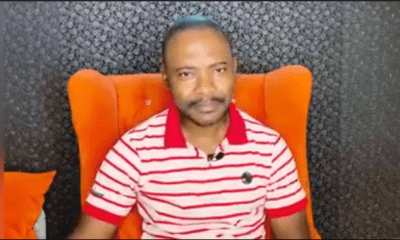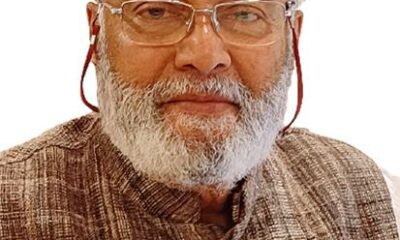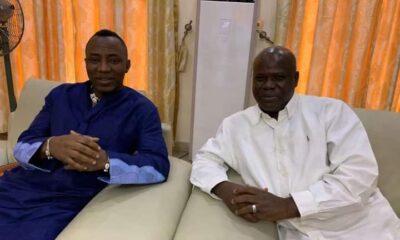Democracy & Governance
COVID-19: Media Houses In Kenya Feeling The Heat Of The Virus -By Ohaga Ohaga
Faced with tough economic times caused by the COVID-19 pandemic, media houses in Kenya are feeling the heat of the virus through job losses, lay-offs, and dwindling revenues.
This became apparent when three leading media houses including Royal Media Services, Standard Group PLC, and Radio Africa Group recently issued a warning that the effect of Coronavirus was taking a heavy toll on their revenue. This, the media outlets claimed called for cost-cutting measures among them salary cuts to remain operational.
Since the first COVID-19 case was confirmed in the country, at least three media houses have slashed staff salaries by 20 and 30 percent, citing a rapid decline in revenues. The media houses have indicated that due to declining advertising revenue they can’t keep up with the monthly wage bills. Many media stations heavily depend on revenues from advertisements. But advertisements have been hard to come by due to the economic recession experienced in Kenya caused by the COVID-19 pandemic.
However, for the Kenyan media, lay-offs didn’t start by confirmation of the first COVID-19 case in the country. Staff retrenchment has been an on-going concern for many industry players since October 2019 when several media companies started sacking its staff.
For instance, in October 2019, Mediamax fired 160 of its staff. On December 19,2019 Radio Africa Group laid off at least 150 of its workforces. On January 2020, Nation Media Group, fired 15 senior editors and managers. On February 2020, BBC intimated that it will cut around 450 jobs as it restructured its operations at the regional bureau in Nairobi.
Meanwhile, Hivisasa, a digital-only publication closed down rendering many of its staff jobless after operating for 6 years. On March 27, 2020 Royal Media Services (RMS) informed all its employees of a plan to cut their gross salary by 20-30 percent because of hostile economic times caused by COVID-19 pandemic.
The same month, March 19, 2020, Standard Group indicated that it was laying off 170 Journalists. The Group CEO, blamed the imminent job losses on the need to realign organizational structure, automation, as well as a shift in consumption trends of media material that has harmed the company’s ability to attract revenue. Even though Kenya Union of Journalists (KUJ), has contested this latest pay cut by the Standard Group in court citing unfair labor practices and lack of consultations the industry can only expect worse.
When did the rain start beating Kenyan media?
Two years after Jubilee Government came to power, President Uhuru Kenyatta through its CS of Finance Henry Rotich wrote to the Attorney General, principal secretaries, chief executives of all State corporations, and independent constitutional commissions informing them about the creation of the Government Advertising Agency (GAA).
The Government Advertising Agency was charged with authorizing public sector advertising and implementing sectoral standards, procedures, guidelines, and managing consolidated Government advertising funds the memo claimed.
However, media analysts condemned the move terming it as an underhand tactic aimed at forcing the media to tell only positive stories about the government. After the creation of GAA, the agency went ahead and placed adds in most of the leading stations in the country amounting to Sh2.5bn shillings. An advertising debt the government is yet to settle.
Lack of payment of this bill has brought misery to concerned media outlets as they can’t meet their monthly wage bills.
Effects of Coronavirus in Newsrooms
With reduced workforce means reduced output. With many journalists sacked, newsrooms are finding themselves understaffed. This means that journalists are not being assigned to cover stories unless it is very significant. This means that a number of ‘insignificant’ events are going unreported.
Two, a thin newsroom means that journalists are working extra hard to plug the gaps left by those laid-off. This compromises the work of journalists hence restraining their capability to fully execute their mandate.
Three, with looming pay-cuts, staff lay-offs, and loss of revenues, journalists find themselves on the edge. Often insecure about their jobs and financial stability. This again hampers their ability to focus on dealing with tasks at hand.
Lastly, to not fully inform, educate and entertain its audience means the media is failing to deliver on its core mandates.
What is of concern is that even though the media has been listed as an essential service by the Government of Kenya – and on two separate occasions been lauded by both President Uhuru and Health CS for good work, their welfare hasn’t been addressed.
When President Uhuru declared tax breaks and capitations the other day, the media wasn’t a beneficiary. In his last address, the President announced a creation of a welfare fund for health workers fighting in the front-line of COVID-19, journalists weren’t beneficiaries.
Way forward
The government of Kenya needs to include media and journalists in the welfare fund as they are playing a very critical role in keeping the nation informed.
Most media stations have dedicated their prime time and acres of newspaper space educating the public on COVID-19 without demanding for payment. The GoK must meet them halfway.
Media outlets also need to step up their efforts to support their staff by developing a shift-based work system instead of staff lay-offs. Lastly, on recognizing the vital need for quality media during the COVID-19 crisis, New Zealand announced an aid package for journalists.
The New Zealand set aside up to NZ$50m to help cover journalists’ salaries, avoid job losses and sustain ailing media during the coronavirus pandemic. The government of Kenya can learn something from the New Zealand Government.
Ohaga Ohaga is a Kenyan Journalist, Writer, and Communication Specialist with special interest in Media Law and Political Communication. He remains a close observer of, and participant in, Journalism and the Media.










